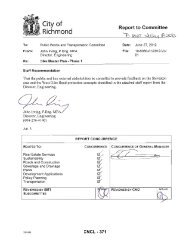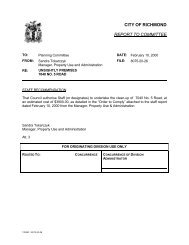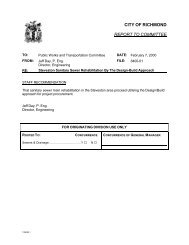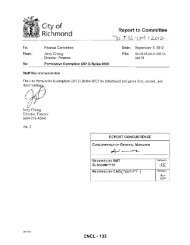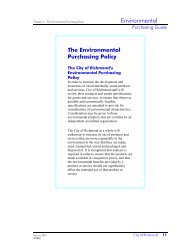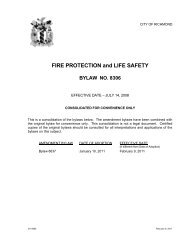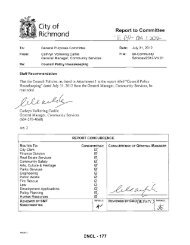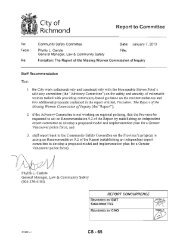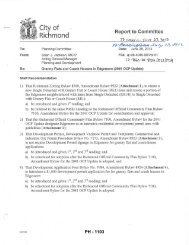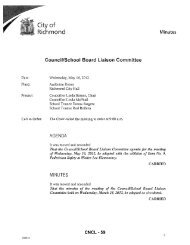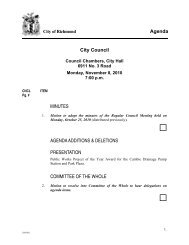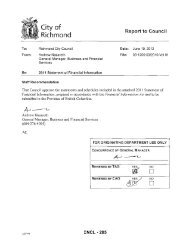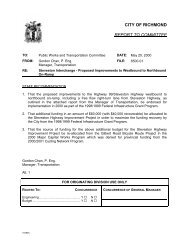Waste Flow Management in Metro Vancouver - City of Richmond
Waste Flow Management in Metro Vancouver - City of Richmond
Waste Flow Management in Metro Vancouver - City of Richmond
You also want an ePaper? Increase the reach of your titles
YUMPU automatically turns print PDFs into web optimized ePapers that Google loves.
April 22, 2013 - 2 -<br />
Orig<strong>in</strong><br />
Staff Report<br />
<strong>Metro</strong> <strong>Vancouver</strong> is currently spearhead<strong>in</strong>g consultation on waste flow management options to<br />
ensure alignment with the susta<strong>in</strong>ability pr<strong>in</strong>ciples <strong>of</strong> the Integrated Solid <strong>Waste</strong> and Resource<br />
<strong>Management</strong> Plan (ISWRMP), <strong>in</strong>clud<strong>in</strong>g enhanc<strong>in</strong>g waste reduction and recycl<strong>in</strong>g as part <strong>of</strong><br />
work<strong>in</strong>g toward the waste diversion targets established under the approved ISWRMP (70% by<br />
2015 and 80% by 2020).<br />
The consultation program is be<strong>in</strong>g undertaken with government and <strong>in</strong>dustry representatives <strong>in</strong><br />
two phases: Phase 1 (November, 2012 - January, 2013) was to consider <strong>in</strong>itial feedback from<br />
which to develop a draft recommended approach. Phase 2, which is currently underway through<br />
to the end <strong>of</strong> May, 2013, is to receive and consider consultation on the recommended approach.<br />
The outcome <strong>of</strong> the consultation process and a recommended approach for waste flow<br />
management will be presented to the <strong>Metro</strong> <strong>Vancouver</strong> Board <strong>in</strong> July, 2013.<br />
This report provides further <strong>in</strong>formation on this issue and highlights the importance <strong>of</strong> regional<br />
actions designed to manage the flow <strong>of</strong> waste with<strong>in</strong> the region.<br />
Analysis<br />
Background<br />
The ISWRMP identifies that <strong>Metro</strong> <strong>Vancouver</strong> will reta<strong>in</strong> management control <strong>of</strong> regional<br />
disposal facilities <strong>in</strong> order to ensure that waste reduction and diversion goals can be applied<br />
uniformly at all regional disposal facilities. This will ensure equity for all residents and<br />
bus<strong>in</strong>esses with<strong>in</strong> the region while support<strong>in</strong>g growth and development <strong>of</strong> the recycl<strong>in</strong>g sector.<br />
As part <strong>of</strong> ma<strong>in</strong>ta<strong>in</strong><strong>in</strong>g management control, the ISWRMP allows for the region to <strong>in</strong>stitute flow<br />
control measures designed to ensure that the municipal solid waste or the garbage portion is<br />
delivered only to regional disposal facilities. <strong>Flow</strong> control <strong>in</strong>itiatives outl<strong>in</strong>ed <strong>in</strong> the plan <strong>in</strong>clude<br />
measures such as: requir<strong>in</strong>g that all municipal solid waste orig<strong>in</strong>at<strong>in</strong>g from with<strong>in</strong> the region be<br />
delivered to approved facilities; a split fee bylaw; franchis<strong>in</strong>g <strong>of</strong> waste collection services and<br />
licens<strong>in</strong>g <strong>of</strong> waste collection service providers.<br />
There is an issue currently where at least one commercial hauler is bypass<strong>in</strong>g regional disposal<br />
facilities and dispos<strong>in</strong>g <strong>of</strong> residential and commercial solid waste outside <strong>of</strong> the region (i.e. waste<br />
export). This results <strong>in</strong> lost revenues s<strong>in</strong>ce these haulerls avoid pay<strong>in</strong>g tipp<strong>in</strong>g fees which are<br />
needed to support the regional system. The estimated annual loss from current waste export<br />
activities is $5 million annually (50,000 tonnes). Further, any hauler who exports waste can<br />
avoid comply<strong>in</strong>g with material disposal bans and prohibitions. These are regulatory tools which<br />
are required to reduce disposal and promote recycl<strong>in</strong>g. Without these tools, the economic<br />
viability <strong>of</strong> the recycl<strong>in</strong>g <strong>in</strong>dustry and established waste diversion goals are compromised. In<br />
addition, disposal <strong>of</strong> waste outside <strong>of</strong> the region creates an uneven play<strong>in</strong>g field for the waste<br />
management <strong>in</strong>dustry. Should <strong>Metro</strong> <strong>Vancouver</strong> be unsuccessful <strong>in</strong> mitigat<strong>in</strong>g this trend, it will<br />
likely result <strong>in</strong> further waste export practices.<br />
'<br />
3823131 GP - 19



